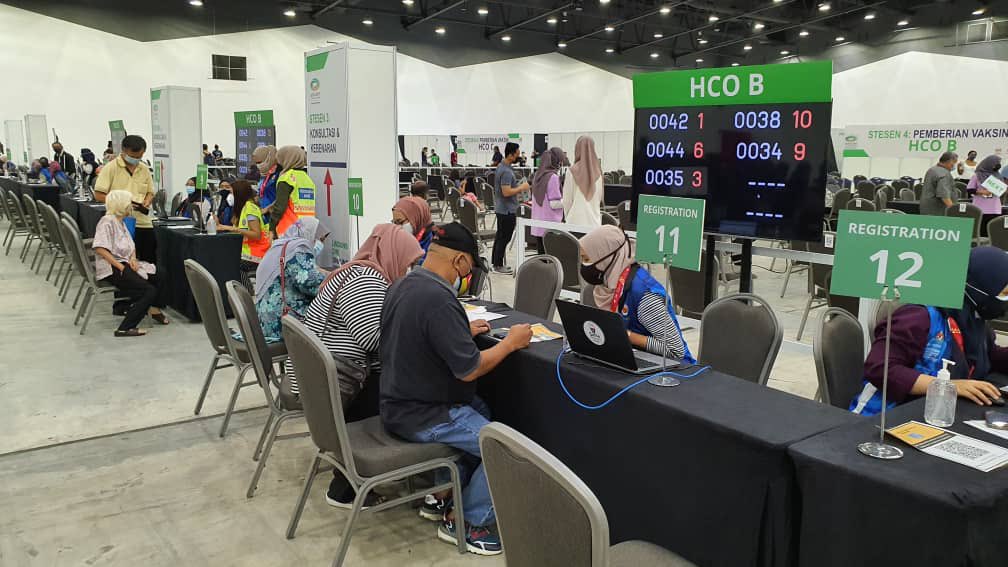KUALA LUMPUR, August 2 — Although medical experts believe that Covid-19 infections will fall amid an accelerated vaccination drive, they say it’s hard to predict if this can be achieved with full inoculation of 40 per cent of adults as expected by the government.
Dr Christopher Lee, the national advisor for infectious diseases in the Ministry of Health (MOH), said in theory, the number of Covid-19 cases may indeed drop if more adults are vaccinated. However, what is more important is the potential impact of vaccination on the numbers of those who are seriously ill.
“The data consistently shows that the vaccines significantly reduce our risk of being seriously ill (or dying) from Covid-19 if we’re fully vaccinated i.e. beyond two weeks from the second dose.
“Vaccines are less effective in preventing infection, especially with Delta variant (different vaccines have different efficacy rates), but all still show robust effects in preventing serious illness and death,” he told CodeBlue when contacted.
United States’ Centers for Disease Control and Prevention (CDC) director Dr Rochelle Walensky said in a statement last Friday that fully vaccinated people infected with the Delta variant could transmit the virus, as a CDC study showed similar viral loads between breakthrough infections and unvaccinated people who contracted Covid-19.
Health director-general Dr Noor Hisham Abdullah reported on July 27 a 12 per cent rate of breakthrough infections in Malaysia that day, as 1,941 of 16,117 new infections had “vaccination history”; he did not specify if vaccination history comprised both partial and complete vaccination.
Dr Lee said the United Kingdom is now seeing a divergence in infection rates from mortality rates, as the latter has dropped significantly.
Citing UK government statistics, Dr Lee noted that the number of Covid-19 cases in the UK has shown an increase in the past month, despite over two in three adults being fully vaccinated.
Hospital admissions are increasing less than cases, but mortality rates are not increasing significantly. “(This is the) impact of the high vaccination rates,” Dr Lee said.
Peter Horby, chair of the government’s New and Emerging Respiratory Virus Threats Advisory Group (NERVTAG), recently told the BBC’s “Andrew Marr Show” that while vaccinations have weakened the link between Covid-19 and serious illness and death, it is “not completely broken”.
“We’re definitely seeing increasing infection rates, but what we’re seeing is a much lower level of hospitalisation, so that link is really, really much weaker which is really fantastic but it’s not completely broken,” Horby was quoted as saying.
University Malaya Medical Centre (UMMC) epidemiologist and public health specialist Prof Dr Sanjay Rampal said vaccine effectiveness against hospitalisation at the population level is directly related to the percentage of the population vaccinated.
A recent UK study by Stowe et al had estimated that the vaccine effectiveness against hospitalisation due to the Delta strains for the Pfizer-BioNTech and AstraZeneca-Oxford vaccines was 96 per cent and 92 per cent respectively.
He said the results are consistent with other studies that a vaccinated population drastically reduces the risks of hospitalisation secondary to Covid-19 infection.
“Likewise, it is anticipated that a lower proportion of Covid-19 cases would require hospitalisation as more of the population gets vaccinated in Malaysia. The effect of the vaccination programme will be more pronounced in states with higher proportions of vaccinated populations,” Dr Sanjay told CodeBlue.
Vaccine Minister Khairy Jamaluddin, in a recent interview with select local media, said he expected Covid-19 cases and hospital admissions to decline this month when 40 per cent of the country’s adult population is fully vaccinated. As of July 31, about 29 per cent of adult residents in Malaysia have completed double vaccination, while 59 per cent have received at least one dose.
Khairy said Sungai Buloh Hospital admissions for Category Four and Five patients among the elderly have shown a downward trend parallel with Phase Two of the National Covid-19 Immunisation Programme (PICK).
Dr Noor Hisham said on July 13 that Covid-19 vaccination helped reduce hospitalisation and intensive care unit (ICU) admissions among elderly patients in the six weeks from June 1.
He noted that the current increase in hospital admissions primarily involves young adults who have not been vaccinated. Dr Noor Hisham then described vaccination as “the solution” so that Malaysia can live with Covid-19.
Greater Klang Valley Special Task Force chief Dr Chong Chee Kheong told Bernama last Saturday that he estimated daily coronavirus infections in the country’s most industrialised region to begin declining from mid-August following mass vaccination. As of July 31, about 93 per cent of Klang Valley adult residents have received at least one vaccine dose, including 36 per cent double vaccinated.
Meanwhile, Permatang Pauh MP Nurul Izzah Anwar, during a special Dewan Rakyat meeting last Monday, expressed concern that Covid-19 cases may multiply if the government rashly eases movement restrictions solely based on vaccination coverage.
She cited countries like the UK and Iceland that saw cases spike in recent weeks, attributed to the emergence of more infectious Covid-19 variants, despite having vaccinated more than 60 per cent of their populations with at least one dose of the coronavirus vaccine.








